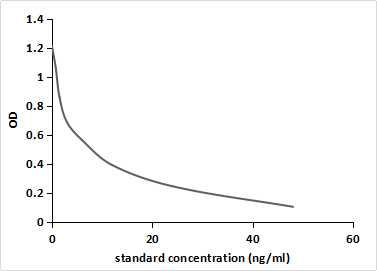Monoclonal Antibody to Digoxin (DGX) 

Cardigox; Cardiogoxin; Cardioxin; Cardoxin; Coragoxine; Digacin; Digicor; Digomal; Digon; Digosin; Digoxigenin; Digoxine Navtivelle; Digoxina-Sandoz; Digoxin-Sandoz; Digoxin-Zori; Dilanacin
- UOM
- FOB US$ 149.00 US$ 349.00 US$ 498.00 US$ 1,245.00 US$ 4,980.00
- Quantity
Overview
Properties
- Product No.MAK639Ge21
- Organism SpeciesPan-species (General) Same name, Different species.
- ApplicationsELISA
If the antibody is used in flow cytometry, please check FCM antibodies.
Research use only - DownloadInstruction Manual
- Category
- SourceMonoclonal antibody preparation, Host Mouse
- Ig Isotype IgG1 Kappa, Clone Number 6-C1
- PurificationProtein A + Protein G affinity chromatography
- LabelNone
- Immunogen CPK639Ge11-BSA Conjugated Digoxin (DGX)
- Buffer Formulation0.01M PBS, pH7.4, containing 0.05% Proclin-300, 50% glycerol.
- TraitsLiquid, Concentration 1mg/mL
Sign into your account
Share a new citation as an author
Upload your experimental result
Review

Contact us
Please fill in the blank.
Specifity
The antibody is a mouse monoclonal antibody raised against DGX. It has been selected for its ability to recognize DGX in ELISA and CLIA.
Usage
Enzyme-Linked Immune Immunosorbent: 0.87µg/mL;
Optimal working dilutions must be determined by end user.
Storage
Store at 4°C for frequent use. Stored at -20°C in a manual defrost freezer for two year without detectable loss of activity. Avoid repeated freeze-thaw cycles.
Stability
The thermal stability is described by the loss rate. The loss rate was determined by accelerated thermal degradation test, that is, incubate the protein at 37°C for 48h, and no obvious degradation and precipitation were observed. The loss rate is less than 5% within the expiration date under appropriate storage condition.









